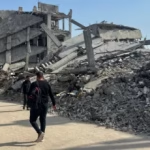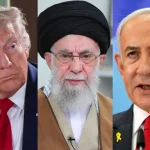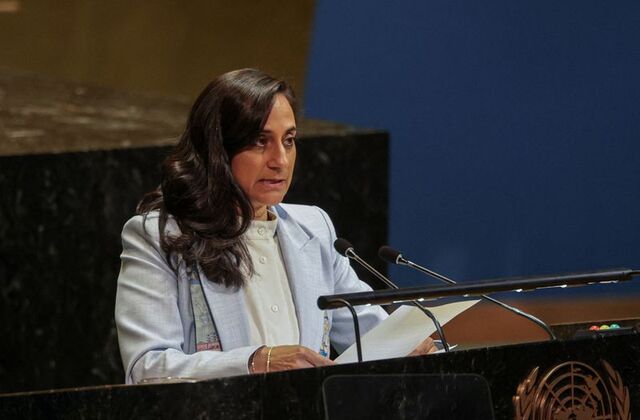In the wake of escalating tensions in the Middle East, the Israeli Ambassador to the United States delivered a pointed message that has resonated across diplomatic circles and international headlines: “We’ll hit them again.” The statement came after a controversial Israeli strike on Hamas leaders allegedly hiding in Qatar, a move that stunned analysts and policymakers worldwide.
- The Strike in Qatar: What Happened
- Why the Ambassador’s Statement Matters
- Qatar’s Role and the Regional Dilemma
- The U.S. Response and the Diplomatic Tightrope
- Historical Context: Israel’s Global Operations
- Regional Reactions: Shockwaves in the Arab World
- Impact on Hamas and Its Strategy
- The International Law Debate
- Economic and Energy Implications
- The Ambassador’s Message to Washington
- Expert Perspectives
- Looking Ahead: Escalation or Diplomacy
- FAQs
- Why did Israel strike in Qatar?
- What was Qatar’s reaction to the strike?
- How has the United States responded?
- Does this mark a shift in Israel’s strategy?
- What are the risks of this approach?
- Conclusion
The ambassador’s words, both defiant and uncompromising, highlighted Israel’s determination to pursue what it describes as a global campaign against terrorism, regardless of geographical boundaries. This unfolding story is not only about one strike, but about the larger dynamics of Israel’s evolving foreign policy, its relationship with the United States, and the changing rules of engagement in the Middle East. To understand the significance of this bold declaration, one must look at the historical backdrop, the diplomatic fallout, the regional security implications, and the broader geopolitical consequences.
The Strike in Qatar: What Happened
The strike that triggered this international uproar targeted a location in Qatar, long seen as a diplomatic mediator in the Middle East but also criticized for its ties to Islamist groups, including Hamas. Israeli officials claimed that senior Hamas operatives had taken refuge in Doha, using the Gulf nation as a safe haven to coordinate strategies, finance operations, and evade direct retaliation in Gaza. Reports suggest that precision munitions were deployed in the strike, signaling not only Israel’s intelligence capabilities but also its willingness to expand its operational theater beyond traditional borders.
For many observers, the strike represented a dramatic escalation—an acknowledgment that Israel was prepared to carry its conflict with Hamas into territories once thought untouchable. In the hours after the attack, Doha condemned the strike as a violation of sovereignty, while Hamas vowed revenge. Yet, it was the Israeli ambassador’s stark message in Washington that turned this military event into a defining diplomatic flashpoint.
Why the Ambassador’s Statement Matters
Diplomatic language is usually measured, cautious, and crafted to avoid unnecessary provocation. When an ambassador, particularly to the United States, speaks with such clarity and aggression, it signals both strategic intent and political calculation. By declaring “We’ll hit them again,” the ambassador effectively announced that Israel considers Hamas operatives legitimate targets anywhere in the world. This is not merely a warning to Hamas but a challenge to nations that provide them sanctuary.
It reflects a doctrine of preemptive and extraterritorial strikes, echoing Israel’s history of bold military operations such as the 1960 capture of Adolf Eichmann in Argentina or the 1976 Entebbe raid in Uganda. Yet this time, the message is being delivered in Washington, underscoring Israel’s reliance on U.S. support while testing how far the Biden administration is willing to tolerate unilateral military actions that disrupt delicate alliances in the Gulf.
Qatar’s Role and the Regional Dilemma
Qatar occupies a unique position in Middle Eastern politics. On one hand, it is a U.S. ally, hosting the Al-Udeid Air Base, one of the largest American military facilities in the region. On the other hand, it has cultivated ties with groups such as Hamas and the Taliban, portraying itself as a mediator capable of engaging actors that Western powers label as extremists.
This dual role has long frustrated both Washington and Jerusalem. For Israel, Qatar’s financial support to Gaza and its political sheltering of Hamas leadership represent direct threats. For the United States, Qatar is both a partner and a complication—an indispensable host of U.S. forces but also a state that often undercuts American counterterrorism objectives. The Israeli strike forced Doha into the global spotlight, challenging its balancing act and raising questions about whether its role as mediator can survive the perception that it provides safe haven for militant leaders.
The U.S. Response and the Diplomatic Tightrope
The Biden administration, already navigating fragile relations with the Middle East, finds itself in an uncomfortable position. Official statements from the State Department called for restraint and emphasized respect for national sovereignty, but behind closed doors, U.S. officials acknowledged the growing frustration with Qatar’s ambiguous role.
According to analysts, Washington fears that open condemnation of Israel’s actions could strain ties with one of its most important allies, while failing to address Qatar’s relationship with Hamas could embolden further escalation. This delicate balance reflects the U.S.’s broader challenge: maintaining credibility in its counterterrorism commitments without alienating Gulf partners whose cooperation remains critical for security, energy, and diplomacy.
The ambassador’s words, delivered in the heart of Washington, were no accident—they were a calculated reminder that Israel expects unwavering U.S. support even when its actions challenge the conventional boundaries of international law.
Historical Context: Israel’s Global Operations
To understand Israel’s posture, one must revisit its history of extraterritorial operations. From targeted assassinations of Palestinian militants in Europe to the destruction of Iraq’s Osirak nuclear reactor in 1981, Israel has repeatedly demonstrated its willingness to act unilaterally beyond its borders when it perceives existential threats. These operations are part of a doctrine known as the “long arm of Israel,” rooted in the belief that survival requires striking enemies before they can strike Israel.
The Qatar strike fits into this tradition, though its political implications are far greater because of the involvement of a Gulf ally closely tied to Washington. Unlike previous operations that often carried an element of secrecy, this strike was followed by a public declaration of intent to continue such actions. This transparency suggests a shift in strategy: Israel is no longer just acting but also broadcasting its resolve to pursue Hamas globally, regardless of the diplomatic cost.
Regional Reactions: Shockwaves in the Arab World
The reaction across the Arab world has been swift and divided. Some nations, particularly those aligned with Hamas, condemned Israel’s actions as reckless aggression and a violation of sovereignty. Others, including countries quietly cooperating with Israel under the Abraham Accords, expressed concern but stopped short of full condemnation, reflecting their shared security worries about Hamas and Iran.
For Gulf states like Saudi Arabia and the UAE, the strike was a reminder of Israel’s unpredictability but also of its determination to confront militant threats that destabilize the region. Egypt, traditionally a mediator between Israel and Hamas, issued cautious statements urging de-escalation but also hinted at the need for Hamas to reconsider its safe havens. The divided responses highlight the shifting alliances in the Middle East, where pragmatic security interests often outweigh ideological solidarity.
Impact on Hamas and Its Strategy
For Hamas, the strike in Qatar is both a strategic and psychological blow. Leaders who once felt secure in Doha now face the reality that Israel’s reach extends far beyond Gaza. Analysts believe that Hamas may be forced to reconsider its global presence, either dispersing its leadership further underground or seeking new sanctuaries in countries less exposed to Western or Israeli influence.
Yet, Hamas is unlikely to remain passive. Its threats of retaliation could materialize in renewed rocket fire, cyberattacks, or attempts to mobilize supporters worldwide. By striking outside Gaza, Israel not only disrupted Hamas’s operations but also raised the stakes of their ongoing conflict. What once was a local struggle confined to Gaza and southern Israel is increasingly becoming a global contest with broader ramifications.
The International Law Debate
The Israeli strike has reignited debates about international law and the legitimacy of extraterritorial military actions. Critics argue that targeting individuals within the borders of a sovereign state without its consent constitutes a violation of international law, setting a dangerous precedent. Supporters counter that when states harbor terrorists or fail to prevent their activities, they forfeit their sovereignty in those specific contexts.
The ambassador’s blunt statement—“We’ll hit them again”—underscores Israel’s position that security imperatives override legal formalities. International lawyers warn, however, that if such a doctrine is normalized, it could open the door for similar justifications by other nations, eroding the global order. For Israel, the legal debate is secondary to survival, but for the broader international community, it raises critical questions about how far nations can go in pursuing security without destabilizing the principles of sovereignty and territorial integrity.
Economic and Energy Implications
Beyond the military and diplomatic dimensions, the strike carries potential economic consequences. Qatar is one of the world’s largest exporters of liquefied natural gas (LNG), and instability in Doha could ripple through global energy markets already strained by conflicts in Ukraine and supply chain disruptions.
Investors worry that heightened tensions between Israel and Qatar could discourage foreign investment or disrupt energy cooperation projects in the Gulf. At the same time, defense analysts note that Israel’s bold stance may bolster its own security technology sector, as allies seek advanced systems to counter emerging threats. The intersection of security and economics underscores the global stakes of what might otherwise appear as a localized conflict.
The Ambassador’s Message to Washington
The Israeli ambassador’s defiance was not only directed at Hamas or Qatar but also at U.S. policymakers. By making such a statement in Washington, the ambassador effectively dared the Biden administration to either align unequivocally with Israel or risk being seen as wavering in the fight against terrorism.
It was a move designed to box U.S. officials into a position where criticizing Israel would carry political costs at home, particularly in a polarized environment where support for Israel remains strong among many American constituencies. At the same time, the ambassador’s remarks appealed to the U.S. public, portraying Israel as a steadfast ally willing to do whatever it takes to protect its citizens, even if that means breaking diplomatic conventions.
Expert Perspectives
Security experts emphasize that this moment represents a turning point in Israel’s counterterrorism strategy. Dr. Michael Horowitz, a Middle East analyst, explained, “By openly declaring its willingness to strike again, Israel is sending a message not just to Hamas, but to every state that considers hosting them.
The era of safe havens may be coming to an end.” Similarly, former U.S. diplomat Richard Haass noted that Israel’s actions, while controversial, reflect the frustration of a state that feels perpetually under siege. “It is difficult to fault Israel for defending itself, but the risk is that it undermines the very international norms that protect smaller states from aggression,” he said. These competing perspectives highlight the broader debate about balancing national security with global stability.
Looking Ahead: Escalation or Diplomacy
The central question now is whether the Qatar strike and the ambassador’s declaration will lead to escalation or force new diplomatic initiatives. Some believe that Hamas may retreat further underground, reducing its visible presence in Doha, while Qatar may quietly pressure the group to limit its activities.
Others fear that the strike could trigger a cycle of retaliation, drawing in regional actors and increasing instability. Israel, for its part, appears prepared for either scenario. The ambassador’s words suggest that Jerusalem will not hesitate to strike again, even if it means further alienating allies. For Washington and its Gulf partners, the challenge lies in preventing a localized strike from snowballing into a broader regional crisis.
FAQs
Why did Israel strike in Qatar?
Israel carried out the strike in Qatar because it claimed Hamas leaders were using Doha as a safe haven to plan and finance operations against Israel. By targeting them outside Gaza, Israel sought to demonstrate that no location is off-limits for those who threaten its security.
What was Qatar’s reaction to the strike?
Qatar condemned the strike as a violation of its sovereignty and accused Israel of reckless aggression. At the same time, it faced international scrutiny over its ties to Hamas and the safe haven it allegedly provided to militant leaders.
How has the United States responded?
The U.S. response has been cautious. While urging restraint and respect for sovereignty, Washington has not directly condemned Israel, reflecting its close alliance but also its delicate ties with Qatar, which hosts a major U.S. airbase.
Does this mark a shift in Israel’s strategy?
Yes. Israel’s willingness to strike in a U.S.-aligned Gulf state and the ambassador’s public statement suggest a new doctrine that emphasizes global pursuit of Hamas leaders, signaling a potential end to the idea of safe havens.
What are the risks of this approach?
The risks include escalation with Hamas, strained relations with Qatar and other Gulf nations, potential disruptions in energy markets, and challenges to international law regarding sovereignty and extraterritorial actions.
Conclusion
The Israeli ambassador’s bold words following the Qatar strike encapsulate a moment of profound transformation in Middle Eastern geopolitics. By declaring “We’ll hit them again,” Israel has not only signaled its resolve against Hamas but also challenged the global norms of sovereignty and safe haven.
The strike has forced Qatar to confront its dual role as mediator and host, tested U.S. diplomatic balancing, and reminded the world that conflicts once confined to Gaza are now spilling into international arenas. Whether this leads to greater escalation or new diplomatic arrangements remains uncertain, but one thing is clear: Israel has redrawn the boundaries of its conflict with Hamas, and the world is watching closely.








